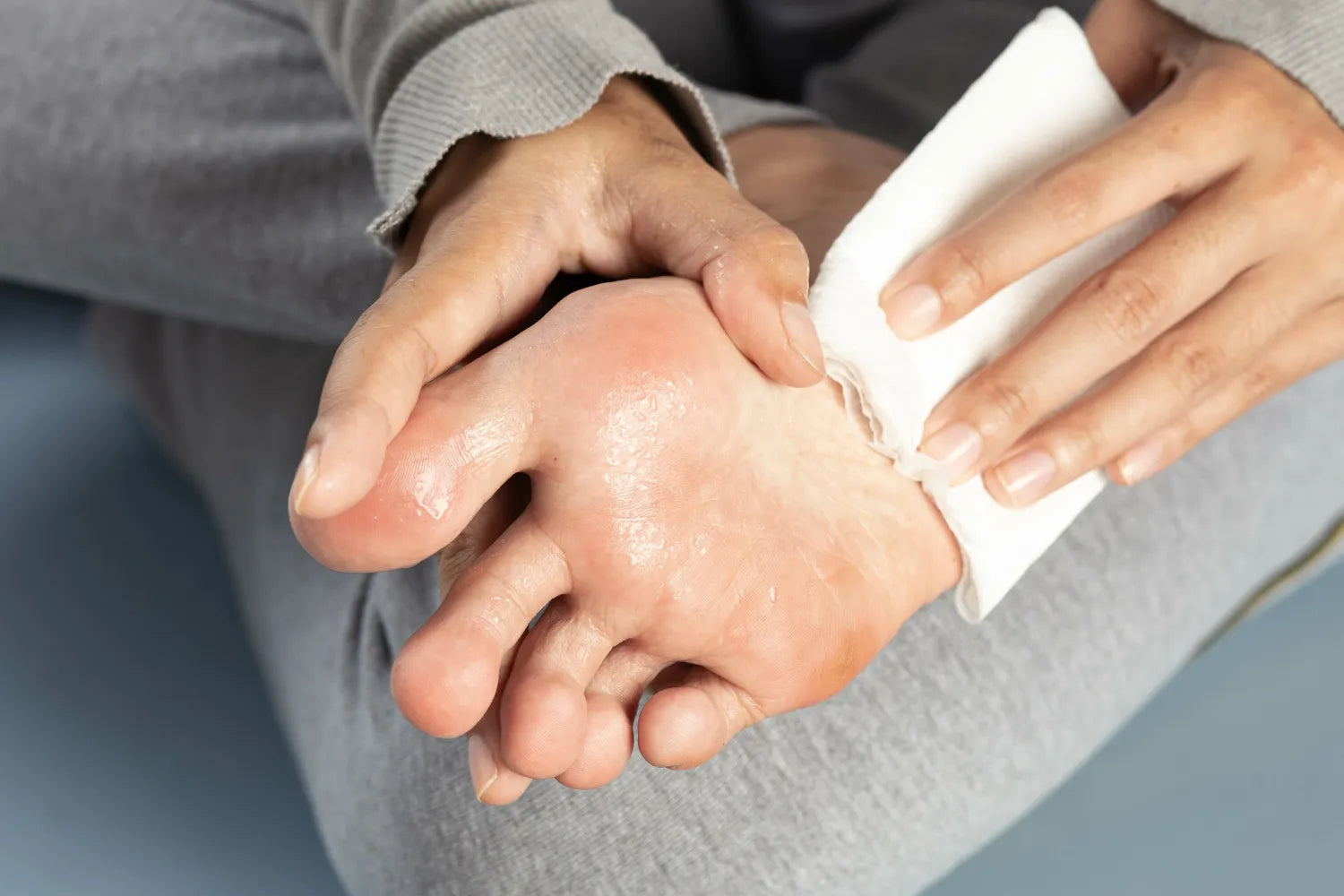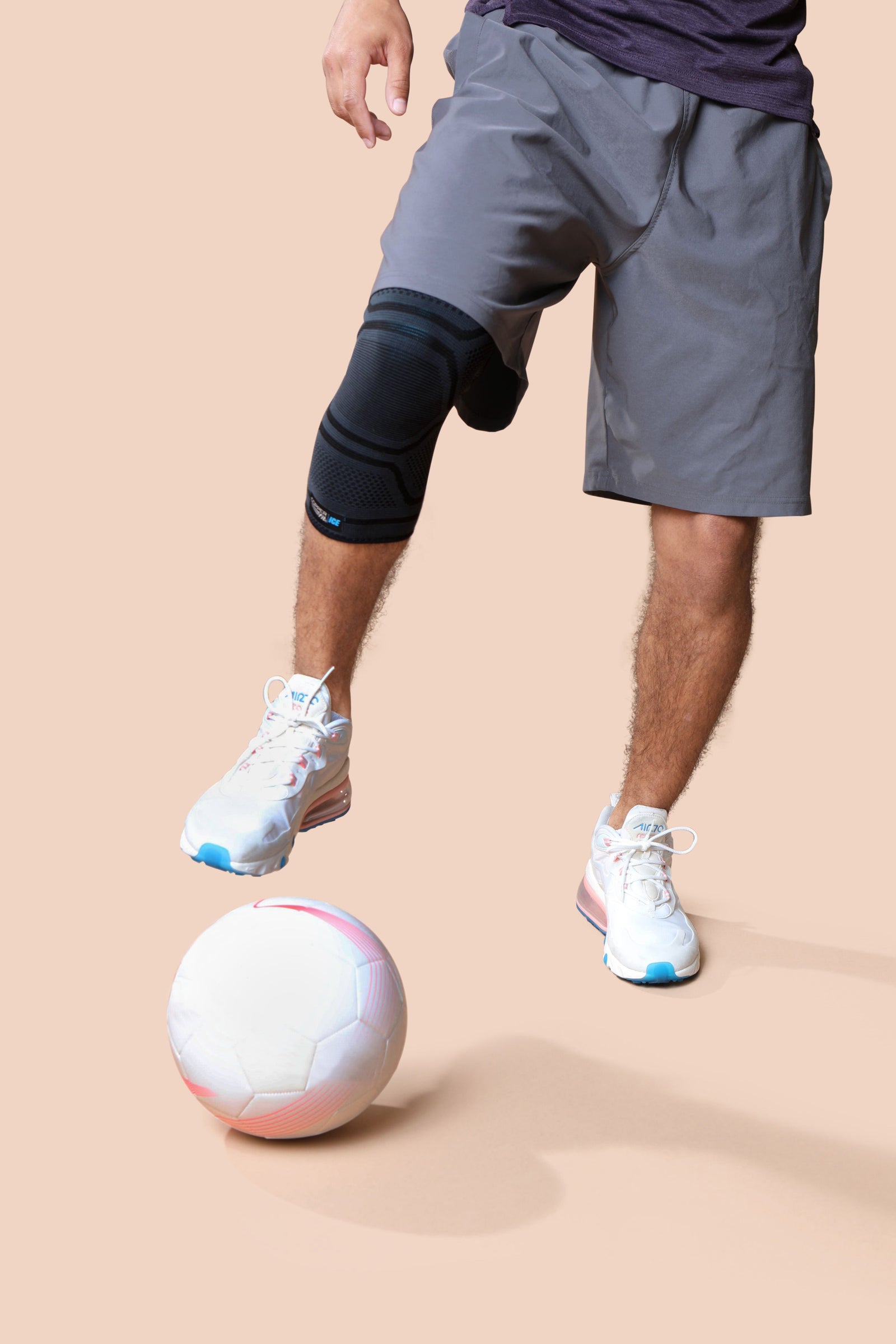
Do you ever wonder why feet smell? If you've ever been embarrassed by a foul odor when you take off your shoes, you're not alone. Foot odor is a common issue that affects many people. Understanding the science behind smelly feet can help you manage this issue effectively.
What Causes Feet To Smell?
Foot odor, scientifically known as bromhidrosis, is primarily caused by sweat and bacteria. The human foot is home to about 250,000 sweat glands that produce up to half a pint of sweat each day. While sweat itself is odorless, it creates a moist environment that's ideal for bacteria to thrive.
These bacteria feed on the sweat and dead skin cells, breaking them down and producing waste products. One of these waste products is isovaleric acid, which is responsible for the characteristic smell of smelly feet.
Shoes, Socks, and Snacks
But it's not just sweat and bacteria that contribute to foot odor. There are other factors that can intensify the issue. The type of shoes and socks you wear, your personal hygiene practices, your diet, and hormonal changes can all play a part.
For instance, synthetic materials in shoes and socks can trap sweat, providing a breeding ground for bacteria. Similarly, certain foods and drinks, such as garlic, onions, and alcohol, can be excreted through sweat, contributing to foot odor.
Moreover, hormonal changes, particularly during puberty and pregnancy, can increase sweat production, thus potentially exacerbating foot odor. In addition, certain medical conditions, such as hyperhidrosis (excessive sweating), can also contribute to the problem. Understanding these factors can help you take proactive steps to manage foot odor effectively.
How Does Sweat Contribute to Foot Odor?
Sweat plays a significant role in foot odor. As mentioned earlier, the human foot has a high concentration of sweat glands. These glands produce sweat to help cool the body and maintain a balanced body temperature.
However, when your feet are enclosed in shoes and socks, the sweat has nowhere to evaporate. This results in damp, warm conditions that are ideal for bacteria to grow and multiply.
It's also worth noting that stress, hormonal changes, and certain medical conditions can increase sweat production, potentially exacerbating foot odor. While sweating is a natural and necessary bodily function, understanding its role in foot odor can help you take steps to manage it effectively, such as using breathable footwear and practicing good foot hygiene.
In the next section, we'll explore the role of bacteria in foot odor, providing a clearer picture of why feet smell and how Copper Fit can help maintain freshness.
What Role Do Bacteria Play in Foot Odor?
Bacteria are a major player in the creation of foot odor. Several types of bacteria live on our skin, but two types are primarily involved in producing foot odor: Staphylococcus epidermidis and Brevibacterium linens. These bacteria thrive in warm, moist environments, making your sweaty feet an ideal home.
Staphylococcus epidermidis is a type of bacteria that's naturally present on the skin. It feeds on the sweat and dead skin cells on your feet, breaking them down into smaller molecules. One of these molecules is isovaleric acid, which has a strong, cheese-like odor.
Brevibacterium linens is the same bacteria responsible for the strong smell of certain types of cheese. It's particularly attracted to damp, salty environments, making sweaty feet an ideal habitat. These bacteria also produce isovaleric acid, contributing to the characteristic smell of foot odor.
Understanding the role of bacteria in foot odor can help you take steps to manage it. For instance, maintaining good foot hygiene can help control the bacteria on your feet, reducing the likelihood of odor.
How Can Lifestyle Factors Contribute to Smelly Feet?
Your lifestyle can significantly influence the severity of foot odor. Factors such as your diet, hygiene practices, and choice of footwear can all contribute to the problem.
Diet
Certain foods and drinks can alter the smell of your sweat, influencing the odor of your feet. For instance, foods rich in sulfur compounds like garlic and onions, as well as spicy foods, can result in more pungent sweat. Similarly, beverages like alcohol and caffeine can increase sweat production, potentially exacerbating foot odor.
Personal Hygiene Practices
The way you care for your feet plays a significant role in controlling foot odor. Regularly washing your feet with antibacterial soap, thoroughly drying them, and changing your socks daily can help control sweat and bacteria, reducing foot odor. Furthermore, exfoliating your feet can remove dead skin cells, which are a food source for bacteria.
Footwear
The type of shoes and socks you wear can also influence the smell of your feet. Synthetic materials can trap sweat, creating a moist environment that's ideal for bacterial growth.
On the other hand, natural materials like cotton and leather are more breathable, helping to keep your feet dry. Alternating between different pairs of shoes can also allow them to dry out completely between uses, reducing the likelihood of odor.
Physical Activity
Your level of physical activity can also impact foot odor. More active individuals may sweat more, especially on their feet. Wearing breathable footwear during exercise and changing into fresh socks afterward can help manage sweat and odor.
Understanding these lifestyle factors can help you manage foot odor effectively.
How Can Compression Gear Help Maintain Freshness?
Compression gear is designed to provide support and stability, which can be particularly beneficial during physical activities. Compression gear works by applying a balanced pressure to specific body parts, helping maintain support during movement.
This can help keep muscles warm, potentially reducing the risk of strains or sprains. It's also believed that compression gear can help reduce muscle soreness and fatigue.
Moreover, CopperFit compression gear is made with special fabrics designed to wick away moisture, helping to keep your feet dry and comfortable. Some products even feature materials like copper, which is known for its antimicrobial properties. These properties can help control the growth of bacteria, thereby helping to manage foot odor.
What Other Steps Can You Take To Manage Foot Odor?
In addition to considering Copper Fit products, there are other steps you can take to manage foot odor.
Here are some comprehensive strategies that can help you keep your feet fresh:
- Proper Foot Hygiene: Regularly washing your feet with antibacterial soap can help control sweat and bacteria, reducing foot odor. Don't forget to clean between your toes, as this area can often be overlooked. After washing, thoroughly dry your feet to prevent a moist environment where bacteria can thrive.
- Breathable Footwear: Choose shoes and socks made from natural, breathable materials, such as cotton or leather. These materials can help keep your feet dry, reducing the likelihood of odor. Try to avoid shoes made of synthetic materials as they can trap sweat, creating a breeding ground for bacteria. Also, consider rotating your shoes to give them a chance to fully dry out between wears.
- Regular Foot Care: Regularly exfoliating your feet can help remove dead skin cells, reducing the food source for bacteria. Using a foot deodorant or antiperspirant can also help control sweat and odor. Consider using foot powders or sprays that are designed to reduce foot odor.
- Proper Sock Choice: Wear socks that wick away moisture. Materials like cotton or wool can help keep your feet dry. Also, consider changing your socks during the day if they become damp from sweat.
- Dietary Considerations: Certain foods can contribute to foot odor. Try to limit foods that can lead to smelly sweat, such as garlic, onions, and spicy foods. Drinking plenty of water can also help dilute sweat and reduce odor.
- Professional Help: If foot odor is persistent and affecting your quality of life, it may be worth seeking help from a healthcare professional. They can provide personalized advice and treatment options. This can range from recommending specific over-the-counter products to prescribing stronger treatments.
Manage Foot Odor for Good
The first step toward managing foot odor is understanding its causes. Factors such as sweat, bacteria, and lifestyle can all contribute to the problem. However, with the right strategies, including good foot hygiene, breathable footwear, and regular foot care, you can effectively manage foot odor. If foot odor persists despite these changes, don't hesitate to seek professional help.
At Copper Fit, our mission is to support your comfort and recovery, empowering you to stay active and feel your best every day.
Sources:
Beware of the Shower Floor | University of Utah
Staphylococcus epidermidis Infection - StatPearls | NCBI Bookshelf
Foot Care | Smithsonian Institution
Foods and drink that affect body odor | Ohio State Health & Discovery





